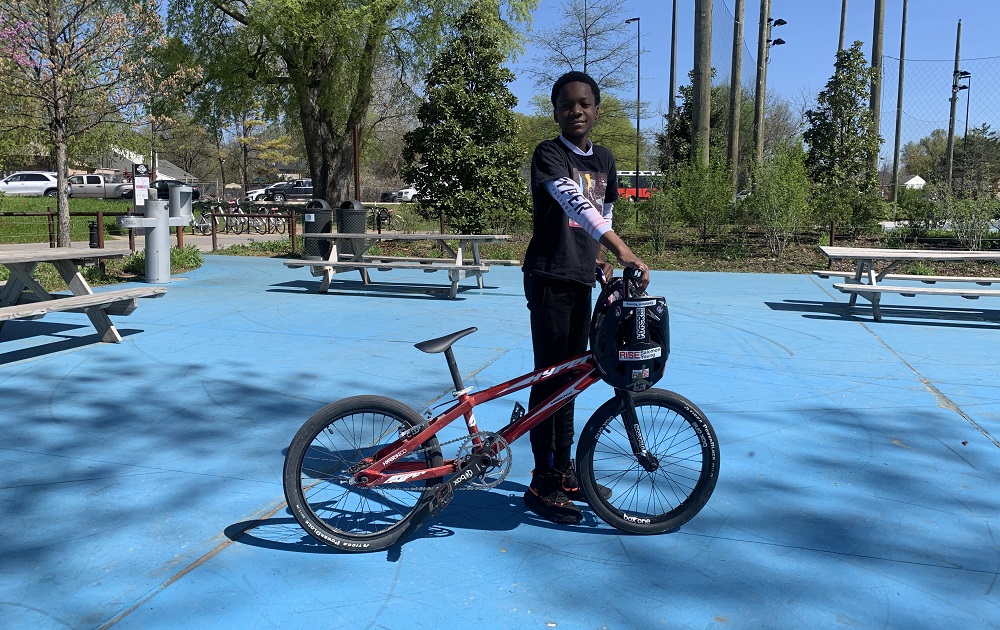TULSA, Okla. — When Salomon Young’s friends talk about sports, they’re talking about football, basketball, maybe soccer. But Salomon, 13, thinks about pedaling furiously toward the finish line.
Salomon learned his love of biking from R.I.S.E., a six-month mentorship and education program run by the USA BMX Foundation and the Terence Crutcher Foundation, both based in Tulsa, Oklahoma.
The Terence Crutcher Foundation, which works to end racial violence and racial inequities, is named for an unarmed Black man who was shot and killed by a police officer in Tulsa in 2016.
The R.I.S.E. program grew out of a conversation between Shane Fernandez, president and chairman at USA BMX, and foundation Executive Director Tiffany Crutcher about the value of showing the mostly Black kids and teens in North Tulsa a sport many had never heard of — and of diversifying bike motocross, said Eric Gill, the foundation’s community engagement director.
Without R.I.S.E., “nobody would know that BMX is like a real sport,” Salomon said of himself and his peers.
R.I.S.E, which stands for resiliency, inclusion, social awareness, and education, launched in summer 2022 at the BMX headquarters in Tulsa with 21 participants — 16 boys and five girls — ranging from 4th to 8th grades. The program focused on youth in North Tulsa who may not have the resources to take part in such activities, said Gill. Each participant received a bike, safety gear and a jersey.
“Anytime we can expose North Tulsa youth to an activity that is kind of outside of their scope is always beneficial,” Gill said. “Not too many African Americans participate in BMX. And so exposure is a huge part of it.”
“What we wanted to do was really provide mentorship, both with the community, and with our athletes.”
Shane Fernandez, USA BMX
R.I.S.E. participants came to the BMX headquarters every two weeks for four hours at a time.
Each R.I.S.E class started with a discussion led by Tulsa-area leaders such as a local attorney and a local school leader, among others.
“What we wanted to do was really provide mentorship, both with the community, and with our athletes,” Fernandez said.
The program was broken down into segments, Fernandez said. It started with the question of where the participants came from. Next, they were asked where they wanted to go. The final segment sought to answer the question how do the participants get there. Through it all, the kids kept a journal to document their story for themselves. They also toured Greenwood and Historic Black Wall Street, Fernandez said.
BMX racers including two-time Olympian Brooke Crain and World Champion Alec Bob coached the R.I.S.E participants, who spent time on the bikes at the BMX headquarters learning to ride on the world-class track, Fernandez said, and learning how bikes work.
The BMX foundation is considering expanding the program to other cities, including Oklahoma City, Fernandez said.
In November, Salomon, who had tried BMX once before, competed in the Grand Nationals Championship at the BMX headquarters in Tulsa, representing Team Terence Crutcher. His division included more than 70 other competitors, including a few other R.I.S.E participants. More than 3,600 athletes from all over the U.S. and abroad competed in the bike racing competition, from amateur athletes to elite-level competitors.
Facing other competitors with more experience, Salomon couldn’t always keep up or make it over the hills
“I got to see where I was at on skills, and I’m a total noob,” he said, referring to “newbie” status.
But the championship was a learning experience, he said.
“It’s not all about getting fast and being better than others,” he said. “It’s more like accepting that I’m slower. I’m not as fast as you … But you just have to accept that and you have to try to get better.”
***
Kristi Eaton is a Tulsa-based journalist.


























